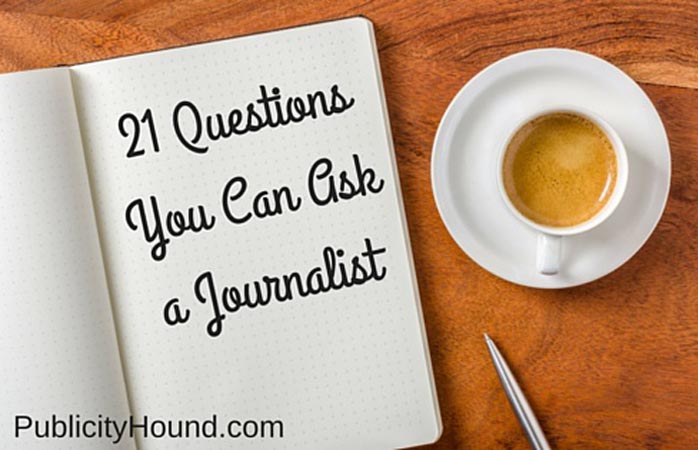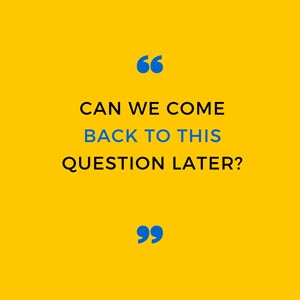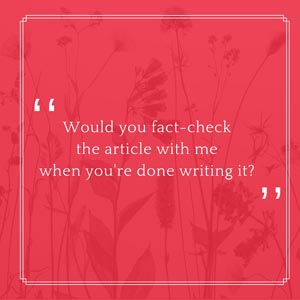
If you’re contacted by a journalist, knowing the types of questions you can ask them will help you both. These fall into three categories:
- Questions you can ask to help you decide whether you should do the interview and how to prepare for it.
- Questions you can ask them during the interview.
- Questions you can ask afterward.
Last week, I shared 14 Questions You shouldn’t Ask Journalists. But I don’t want you to think you’re subservient to them. Media relations can be a tricky game that has rules the media won’t take the time to explain to you. Knowing them going into an interview will help you put your best forward should you decide to play. Here, then, are the questions you can ask.

Before the Interview
1. “Can you tell me more about what the story is about?”
This is important because the topic of the story might not have anything to do with you or your area of expertise. If it doesn’t, you can decline. Better to know this before you and the journalist waste each other’s time.
2. “Would you like the name of someone who CAN help you?”
If you know someone who would be a perfect fit for the story and would welcome a call from a journalist, offer their contact information. This will help position you as a helpful source.
3. “How much time will you need for the interview?”
Almost no one asks this question. But the answer will reveal valuable clues about how deeply the reporter will delve into the topic.
“I only need about five minutes of your time” is drastically different than “If we could set aside one hour, that would be great.”
If it’s one hour, you’ll want spend more time preparing.
4. “What angle are you taking?”
This is an excellent question if the reporter is writing about a controversial topic like gun control, abortion, global warming or vaccinating children. If the reporter says something like, “The angle is that too many children are suffering mental and physical problems as a result of vaccinations,” that tells you the reporter is taking a stand on the issue. You can then decide if you want to participate.
5. “Would you like my media kit?”
A media kit is a collection of information about you that includes things such as your bio, photos, company profile, frequently asked questions, and links to other publicity you’ve received. It’s available at your website, under a button called “Media Kit,” “Media Room,” “Press Kit” or “Press Room.”
Media kits can save a lot of time because journalists won’t have to ask questions about routine information that they can find in the Media Kit. Make sure the kit is updated.
6. “Is it OK if our PR person sits in on the interview?”
If you work for a bigger company, college, university or nonprofit, it isn’t unusual for your PR person to join you for the interview. Make sure, however, that your colleague doesn’t take over the interview, answer questions when you should be answering them, or act as your body guard to deflect difficult questions.
7. “I’m really busy right now. Can I call you back in a half hour?”
Ask this when a reporter calls or emails you out of the blue, and you’re not quite sure if you want to participate in the interview. Buying time will let you research the reporter (Google the name).

During the Interview
8. “I don’t understand the question. Can you provide a few more details?”
If you’re at all uncertain about the question, ask the reporter to explain it. You can also repeat the question in your own words and say, “Are you asking me…”?
9. “I don’t know. Is it OK if I get back to you later with the information? What’s your deadline?”
Reporters don’t expect you to have the Library of Congress in your head. If they ask you for a statistic, for example, and you don’t have it, offer to return the call later or email them what they need.
10. “I lost my train of thought. Can we come back to this question later?”
Sometimes your mind goes blank. Ask this when you want to answer it but you can’t think of it right now. Don’t be surprised if the reporter never returns to this question.
11. “Would you like an example of what I’m referring to?”
If an example would illustrate a point you’re trying to make, offer it.
12. “Would you like a (map, pie chart, bar chart, frequently asked questions, video, audio, infographic)?”
Journalists love these little extras. Make sure you own the rights to what you’re offering.
13. “Are you looking for photo ideas?”
Some reporters are so busy researching the story that photo are an afterthought. If you ask this question, you might get a photo as well as a story.

After the Interview
14. “Would you like to fact-check the article with me when you’re done writing it?”
A fact-check is when the reporter calls or emails you and checks pertinent facts within the article. Example: Your company has eight employees. You were born in Pittsburgh. You started your business in 2011.”
Reporters might not always have time to fact-check. Some won’t agree to do it. But it never hurts to ask.
15. “Would you agree to call me after you’ve written the story and read back the direct quotes you’re going to use?”
Not all reporters will agree to use this either because they’re afraid you won’t like the way a quote sounds and you’ll ask them to change it. Usually, that means you’ll ask them to water it down. Other reporters won’t have the time to do this. Again, it never hurts to ask, especially if the story is on a sensitive topic.
16. “What’s you best guess as to when the story will be published?”
If the story isn’t published on the date the reporter gives you, don’t panic, and don’t keep asking. Set up a Google Alert. Two or three weeks later, if you still haven’t seen it, send the reporter an email and use the subject line, “Did I miss it?”
17. “Do you need other sources?”
Offer sources for the story the journalists interviewed you for, as well as for upcoming stories they’re researching.
18. “May I call you again in three months?”
If you’re a valuable source, journalists will want to stay in touch with you. If they say yes, mark your calendar and follow up by pitching a story idea, even if it isn’t about you. This shows you’re genuinely determined to help them.
19. “May I add you to my email list?”
If you publish a tip of the week or a newsletter, and journalists loved the interview, they’ll want to stay in touch. Explain the types of content you share. And remind them that they can unsubscribe at any time.
20. “How else can I help you?”
This is an invitation for them to make suggestions you might think are odd. For example, if you’re a banking expert, a banking reporter who’s new to the banking beat might ask you for your mobile number so he can call or text you with questions during the evening, when you’re not in the office and he’s on deadline. You don’t have to worry about trusting journalists with a mobile number.
21. “How do you prefer to receive pitches?
Even if you pitched correctly the first time, it never hurts to hear them confirm that you pitched correctly. Or give this gives them a chance to give you specific instructions.
Don’t ask all of these questions. But use them when you need them. Several of them show that you’re media-savvy, and that you’re worth developing as a great source. Did I miss any? What questions have you asked before, during and after interviews?






Thanks Joan for affirming that it’s okay to ask questions. It’s often intimidating with journalists. These are great ways to engage with journalists and stay connected.
That’s right, Ellen. Journalists know all the rules. The news sources seldom do, unless they’ve been media trained or have read articles like this one. Thanks for stopping by.